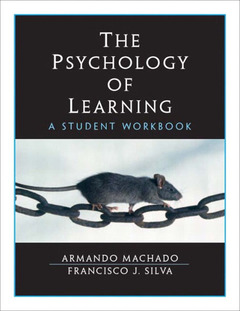Description
Psychology of Learning, paperback
Authors: MACHADO Armando, SILVA Francisco J.
Language: English
Approximative price 51.74 €
Subject to availability at the publisher.
Add to cart150 p. · Paperback
Description
/li>Contents
/li>Comment
/li>
- For undergraduate and postgraduate courses in the Psychology of Learning, which is also sometimes known as Animal Learning.
The goal of this unique workbook is to supplement Learning textbooks with a collection of exercises that invite students to actively learn about Learning. It promotes an active, hands-on, constructivist approach, one that follows Blooms (1956) taxonomy of instructional objectives. The constructivist approach encourages students to discover the answers to problems rather than simply look up solutions in a book. This workbook replaces the passivity of memorising definitions and procedures with the activities of graphing and interpreting of functional relations - the pillars of theory.
- Module 1: Learning and Variables.
Module 2: Functions and Graphs.
Module 3: Habituation and Its Properties.
Module 4: Basic Principles of Pavlovian Conditioning.
Module 5: Complexities of Pavlovian Conditioning.
Module 6: The Rescorla-Wagner Model.
Module 7: Principles of Operant Conditioning.
Module 8: Creating Behavior (Shaping).
Module 9: Schedules of Reinforcement.
Module 10: What Is a Reinforcer?
Module 11: Punishment and Avoidance.
Module 12: Simple Stimulus Control.
Module 13: Complex Stimulus Control (Cognitive Processes).
Module 14: Choice and Self-Control (Allocation of Behavior).
- A constructivist approach - Assumes that, for information to be remembered long after a course is over, students must discover information and manipulate it by checking new information against old information, revising assumptions, beliefs, and knowledge when the old information no longer seems to work - Enables students to retain the information and understand it more thoroughly.
- An emphasis on drawing and interpreting graphs - Allows students to take an active approach to their learning.
- An emphasis on discovering solutions - Rather than looking them up in a textbook - Makes the subject matter more meaningful and relevant to the student.
- A comprehensive collection of exercises - May be used for in-class discussion, as study guides, as take-home exams, or




